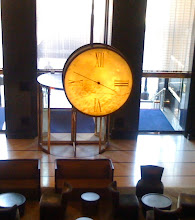In his short story “The Nine Billion Names of God,” published in 1953, Clarke wrote of a pair of computer programmers sent to a remote monastery in Tibet to help the monks there use a computer to compile a list of all the names of God. Once the list was complete, the monks believed, human and cosmic destiny would be fulfilled and the world would end.
The programmers are fleeing the mountain, hoping to escape the monks’ wrath when the program finishes and the world is still there, when one of them looks up.
“Overhead, without any fuss, the stars were going out.”
[From Dennis Overbye's essay, A Boys Life, Guided by the Voice of Cosmic Wonder]
Arthur C. Clarke
died last month. Based on Clarke's short story
The Sentinel, he and Stanley Kubrick wrote the screenplay for
2001: A Space Odyssey, one of Roger Ebert's
Great MoviesTo describe that first screening as a disaster would be wrong, for many of those who remained until the end knew they had seen one of the greatest films ever made. But not everyone remained. Rock Hudson stalked down the aisle, complaining, “Will someone tell me what the hell this is about?'' There were many other walkouts, and some restlessness at the film's slow pace (Kubrick immediately cut about 17 minutes, including a pod sequence that essentially repeated another one).
The film did not provide the clear narrative and easy entertainment cues the audience expected. The closing sequences, with the astronaut inexplicably finding himself in a bedroom somewhere beyond Jupiter, were baffling. The overnight Hollywood judgment was that Kubrick had become derailed, that in his obsession with effects and set pieces, he had failed to make a movie.
What he had actually done was make a philosophical statement about man's place in the universe, using images as those before him had used words, music or prayer. And he had made it in a way that invited us to contemplate it -- not to experience it vicariously as entertainment, as we might in a good conventional science-fiction film, but to stand outside it as a philosopher might, and think about it.
...
Only a few films are transcendent, and work upon our minds and imaginations like music or prayer or a vast belittling landscape. Most movies are about characters with a goal in mind, who obtain it after difficulties either comic or dramatic. “2001: A Space Odyssey'' is not about a goal but about a quest, a need. It does not hook its effects on specific plot points, nor does it ask us to identify with Dave Bowman or any other character. It says to us: We became men when we learned to think. Our minds have given us the tools to understand where we live and who we are. Now it is time to move on to the next step, to know that we live not on a planet but among the stars, and that we are not flesh but intelligence.
[
Update 2008.05.15 I discovered that Roger Ebert has posted a
journal entry,
Arthur C. Clarke: Star hero.]
In a
post (
Arthur C. Clarke: A Techno-Optimist With Climate Concerns) on his Dot Earth blog, Andrew Revkin takes the occasion of Clarke's death for "pausing for a moment to take note of the power of imagination, and fiction, in helping humans step back from the daily rush and examine our predicament and possibilities from a distance."
SPACE.com carried
this tribute, and The Planetary Society has an
article, including a 1983 essay by Carl Sagan,
In Praise of Arthur C. Clarke which he closes by writing
I may have been of some little help to Arthur over the years, for example, with the end of the movie “2001”; and the ideas in such stories as “A Meeting with Medusa.” But what Arthur has done for me is vastly greater. Through his non-fiction books and his science fiction stories and novels, his invention of the communications satellite, his defense of reason against the clamors of superstition, his work in more finely honing the British Interplanetary Society, and through his classic motion picture, Arthur has done an enormous global service in preparing the climate for a serious presence beyond the Earth. I hope that the governments of our epoch will have the sense to continue making Arthur’s dream—shared by so many of us—a reality.
Dave Itzkoff's essay,
The Fuzzier Crystal Ball, discusses the future of science-fiction after Arthur C. Clarke.
And Dennis Overbye's essay carries this postscript:
*By the normal conventions of this paper, by the way, I should be calling him Mr. Clarke or Sir Arthur, on second reference. But there has always been an exception for people who “belong to the ages,” and Arthur C. Clarke has always belonged to the ages.

